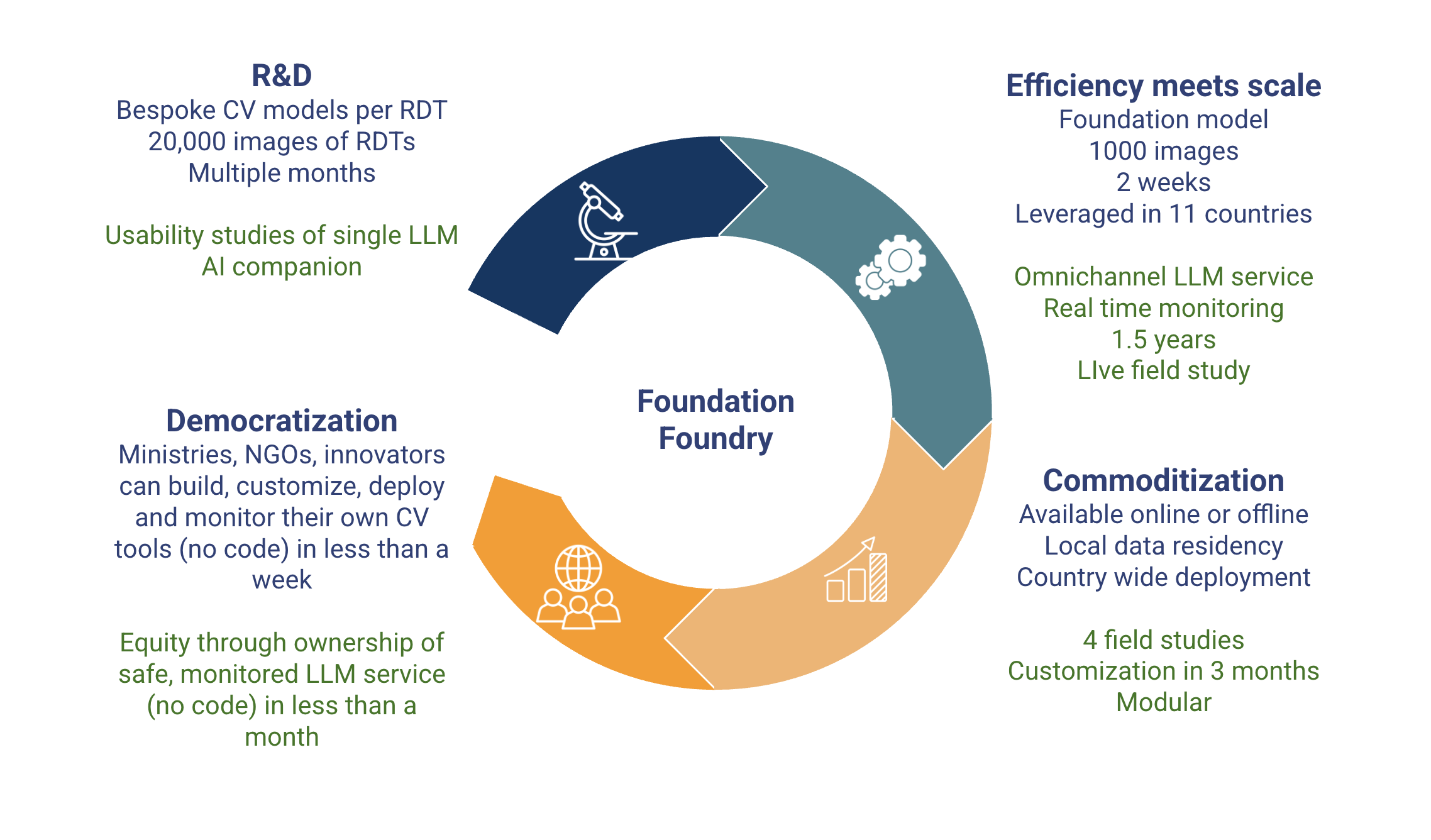The Future Is Local: How the Foundation Foundry Is Democratizing AI for Global Health
In the first two blogs of this series, we challenged the seductive pull of vanity metrics and shared how our hybrid M&E framework ensures AI actually works—and safely—in real-world health settings. But there’s one final piece of the puzzle.
What good is powerful, well-monitored AI if only a handful of organizations can access it?
This post is about what comes next: The Foundation Foundry—Audere’s no-code, self-serve platform that unlocks the power of AI for local innovators, Ministries of Health, startups, and NGOs.
From R&D to Efficient Readiness
When we started this journey, our AI team was a handful of engineers asking, “Could a smartphone become a lab-grade diagnostic tool?” That question evolved into field-tested computer vision (CV) models for rapid test interpretation—now deployed across 11 countries and verified over 1.5 million test results .
Just a few years ago, tuning a model for a single diagnostic test took months of engineering time and more than 20,000 training images. It was powerful, but resource-heavy, expensive, time consuming, and required an advanced degree in computer science to accomplish.
Now, with our new foundation CV model that can interpret any standard two- or three-line rapid diagnostic test with >90% accuracy out of the box, without any pre-training, the landscape has changed entirely. We can now fine-tune for >95% accuracy recognizing and reading a new test with just ~1,000 field images—in two weeks or less. This efficiency, flexibly available via a web service API or a fully offline, small sized mobile SDK - enables the CV to augment rapid testing programs at any level of care, anywhere in the world. And is even more powerful when paired with other services from our integration toolkit.
This leap in efficiency and flexibility means our tools aren’t just scalable—they’re accessible. And that accessibility is the first step in democratizing AI.
Introducing the Foundation Foundry for CV
Enter the Foundation Foundry
With catalytic support from The Gates Foundation and The Patrick J. McGovern Foundation, we went from R&D -> Scale ready and have now reached a stage of commoditization - we’ve evolved from building models for programs to building platforms that enable programs to build their own.
The Foundation Foundry does something radical: it hands the keys of AI development to those who know the context best.
Want to build a CV model that can read your own rapid tests, in addition to the suite of over 30 rapid tests for HIV, malaria, and COVID already supported? Just upload a 1,000 field images of the new standard rapid test. In a few days, you’ll have a CV model that supports all your tests—no PhD, no code required. Want to integrate it? With just a button click, download a lightweight SDK for on-device use satisfying your use case and data residency requirements.
This isn’t a one-size-fits-all tool. It’s an ecosystem that lets you build for your specific needs—accurately, privately, and safely. And it will be available for use later this year.
Audere’s Journey from R&D to Efficiency to Commoditization to Democratization of AI
Extending to Language Models—With Guardrails
Building on our experience with Aimee, our safe, empathetic AI companion for self-care, the Foundry is next going to be expanding to include customizable language model services.
Here's what that means in practice:
You can customize a chatbot for maternal health, mental health, HIV prevention, or your specific use case tailored to your community using starter prompts and building your own, using your own knowledge base and additional customizations.
You can evaluate multiple LLMs and pick the best performer for each task (providing counseling or coaching directly to consumers or health workers, summarizing conversations for clinical use, or extracting structured data for risk stratification) prioritizing performance metrics like empathy, accuracy, cost, or tone.
You can automatically monitor for hallucinations, stigma, or bias using the same automated M&E engine we use in live deployments. With this, you can adopt our hybrid approach, where only 1–5% of conversations need human review—dramatically lowering costs and limiting reviewer exposure to sensitive content in GBV, SRH, or trauma use cases.
The result? A custom LLM service evaluation and customization pipeline that is faster, more efficient, and infinitely more accessible than ever before.
Democratizing AI, Intentionally
Image created with ChatGPT4o
AI won’t democratize itself. The technology may be open-source, but real-world readiness takes infrastructure, training, and safe delivery. The Foundry closes that gap by giving local health innovators the power to build, adapt and improve AI for their context, without needing an advanced engineering team.
R&D used to take years. Now it can take weeks.
Efficiency used to require elite teams. Now it’s in reach of any innovator with local data.
Commoditization used to mean losing control. Now it means regaining it—safely, transparently, and on your terms.
Because equity in AI doesn’t just mean access to tools. It means the ability to build, monitor, and adapt those tools yourself. And that’s what the Foundation Foundry delivers.
The Invitation
We’re opening the doors for our Computer Vision Foundation Foundry.
If you’re a Ministry, NGO, or startup ready to build the next generation of AI-powered health tools—without writing a line of code—Foundry is for you.
You’ll own your data. You’ll own your models. And, where applicable, you can even share in any future monetization of jointly contributed tools. Because we believe local innovation should drive global health—period.
If you’d like to be one of the first organizations or countries to try it out, stay tuned as we’ll be launching a call for Beta testers soon!
Sign up here to be notified when it is available!
A Final Word
Over the past six years, Audere’s technology has evolved from R&D to readiness, from experimentation to scale. But our goal isn’t just to build excellent AI. It’s to make excellent AI buildable by anyone.
Let’s build together.



